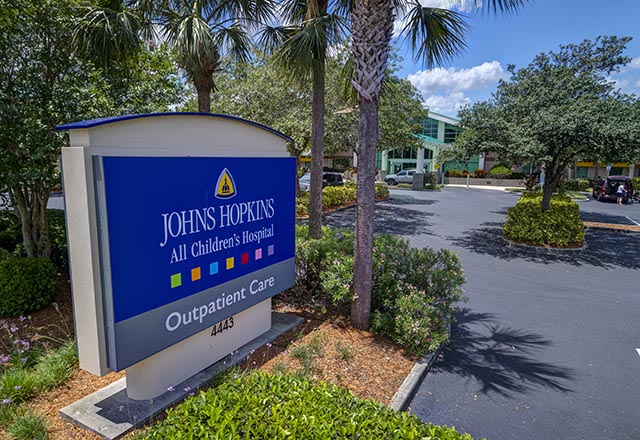Hip surgery at Johns Hopkins All Children’s Hospital is performed by orthopaedic surgeons specially trained in hip preservation and minimally invasive surgery techniques.
For children with a hip disorder, the hip specialists at Johns Hopkins All Children’s Hospital aim to restore their natural hip function so your child can get back to the activities they enjoy most. We treat a wide range of hip disorders in patients of all ages, from infant to young adult.
Treatment for hip disorders at Johns Hopkins All Children’s is provided by the surgeons at Children’s Orthopaedic and Scoliosis Surgery Associates, L.L.P. (COSSA). They provide expert evaluation, diagnosis, and management of congenital, developmental, neuromuscular, and traumatic hip disorders. COSSA's Drew Warnick, M.D., and Daniel Bland, M.D., are both board-certified orthopaedic surgeons with specialized training in hip preservation.
In addition to standard imaging technologies like X-rays, CT scans and MRI, we also use disease-specific MRI protocols and 3-D CT reconstructions to help guide treatment. Better imaging of the hip means our physicians can provide a more accurate diagnosis and determine the best course of treatment, including surgery when needed.
Hip Preservation
For teens with hip disorders, these often-painful conditions, if left untreated, can lead to early degeneration and premature osteoarthritis of the hip joint in otherwise healthy and active young adults. When this degeneration and osteoarthritis becomes severe, hip replacement—replacing the patient’s natural hip joint with a metal and plastic hip joint—is often the only solution.
Hip preservation involves using treatment strategies to correct any structural abnormalities of the hip in young patients to decrease pain and stop the progression of hip degeneration or osteoarthritis, before full hip replacement surgery becomes necessary. While hip replacement surgery fixes the structural abnormalities in a patient’s hip joint, a young patient with hip replacement often needs multiple joint replacement surgeries throughout his or her life as they grow.
As our understanding of hip disorders continues to advance, our specialists are able to better identify underlying conditions in earlier stages, providing patients with more treatment options that help to preserve their natural hip joint, improve hip function and eliminate pain. The surgical team at Johns Hopkins All Children’s includes board-certified orthopaedic surgeons trained in specialized hip preservation techniques that are only available at a few centers on the entire west coast of Florida.
These techniques include surgical dislocation of the hip, the Ganz Periacetabular Osteotomy, and surgical head realignment after slipped capital femoral epiphysis. Our physicians also are trained in minimally invasive surgical techniques such as hip arthroscopy, which can sometimes reduce the need for more extensive and invasive surgeries.
What to expect before and after surgery
Pre-operative office visit
- We will take X-rays of your child to assist in planning his or her surgery. Additional studies may be needed to fully assess your child’s condition. These may include an MRI, arthrogram, CT, and/or bone scan.
- We will discuss details of the surgery with you so you know what to expect.
- Your surgeon will obtain a comprehensive history and physical to include all other health conditions, any current medications your child is taking, and any allergies or bad reactions they have to medications, latex, etc.
Pre-operative hospital visit
- We will order blood and urine tests for your child to make sure he or she is healthy and doesn’t have an infection.
- You’ll meet with a pain management specialist to discuss how they will effectively keep your child comfortable after surgery.
- Your child will be admitted the day of his or her surgery.
After surgery
- Your child’s hospital stay will likely last one to five days after surgery. Every case is different, and your child’s stay may be longer or shorter depending on their individual condition.
- Your child will be administered pain medication upon being discharged from the hospital.
- You will be given specific instructions for physical therapy, weight bearing status and wound care.
- Your child will have a follow-up appointment with us about three weeks after surgery, unless your physician chooses otherwise.
Hip Dysplasia
When a child has hip dysplasia, this means the ball and socket joint of the hip does not align correctly. The hip may be completely dislocated or the socket may be just a little shallow, and it may affect one or both of the hips. Hip dysplasia is found in babies and young children. The most common method to identify hip dysplasia is a physical exam of the hips, feeling for any instability or looseness.
We most often see hip dysplasia in babies and young children that are the first born, female, breech delivery, or where there is a family history of the disorder. If an infant may be at risk for hip dysplasia, your pediatrician or orthopaedist may recommend an ultrasound to help diagnose it.
Signs that your child may have hip dysplasia include:
- Unequal leg lengths
- Uneven skin folds on the thighs
- Less flexibility on one side, particularly abduction, which is the movement of a limb away from the midline of the body
- Limping, toe walking, or waddling in a child who has learned to walk
When detected in early infancy, a non-surgical positioning device called a Pavlik harness may be used to keep a child’s hips flexed and abducted, correcting the alignment issues. Babies typically wear the harness for two to three months or until the hip issues are corrected. Afterward, we typically follow patients for several years to make sure the child’s hips continue to function correctly.
If hip dysplasia is identified in the first few months of life, it can almost always be treated non-surgically, though surgery may be necessary in a few cases.
Conditions we treat include:
- Acetabular dysplasia
- Avascular necrosis
- Cerebral palsy hip disorders
- Developmental coxa vara
- Developmental dysplasia of the hip
- Femoroacetabular impingement
- Cartilage and labrum tears of the hip
- Legg-Calve-Perthes disease
- Post-traumatic hip deformity
- Slipped capital femoral epiphysis
Some signs that your child may have a hip disorder include:
- Hip pain or aching hip
- Clicking in the hip
- Hip feels tight
- Frequent groin pulls
- Hip or groin pain during sports or other physical activity
- Unable to sit through a movie
- Trouble getting out of a car
Meet Our Hip Specialists
Drew Warnick, MD
Orthopaedics
Dr. Warnick is a pediatric orthopaedic surgeon at Johns Hopkins All Children’s Hospital. He sees patients in the St. Petersburg and Tampa locations of Children's Orthopaedic and Scoliosis Surgery Associates (COSSA), L.L.P.

Daniel Bland, MD
Orthopaedics
Dr. Bland is a pediatric orthopaedic surgeon at Johns Hopkins All Children’s Hospital. He sees patients in the St. Petersburg and Tampa locations of Children's Orthopaedic and Scoliosis Surgery Associates (COSSA), L.L.P., and the Johns Hopkins All Children’s Outpatient Care locations in East Lake and Pasco.

Contact Us and Location Information
Children's Orthopaedic and Scoliosis Surgery Associates
Orthopaedic and scoliosis surgery and services at Johns Hopkins All Children’s and its outpatient locations are performed by All Children’s Orthopaedic and Scoliosis Surgery Associates (COSSA), L.L.P. The COSSA team brings extensive experience in orthopaedic and scoliosis surgery.
Visit the Children’s Orthopaedic and Scoliosis Surgery Associates website for more information or to request an appointment online.
-
Children’s Orthopaedic and Scoliosis Surgery Associates
St. Petersburg 625 6th Avenue South, Suite 450
St. Petersburg, FL 33701
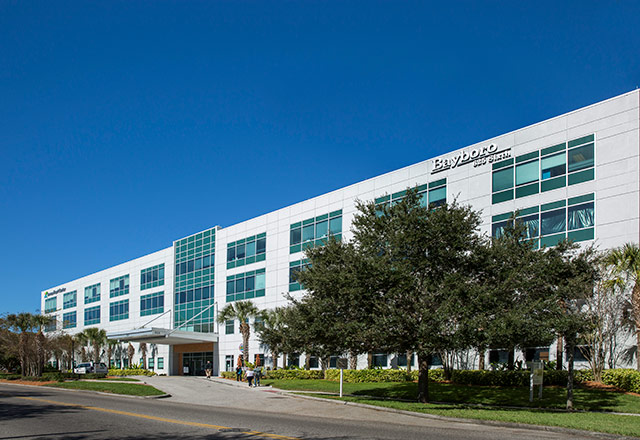
-
Children’s Orthopaedic and Scoliosis Surgery Associates
Tampa 3440 W. Dr. Martin Luther King Jr Blvd., Suite 200
Tampa, FL 33607
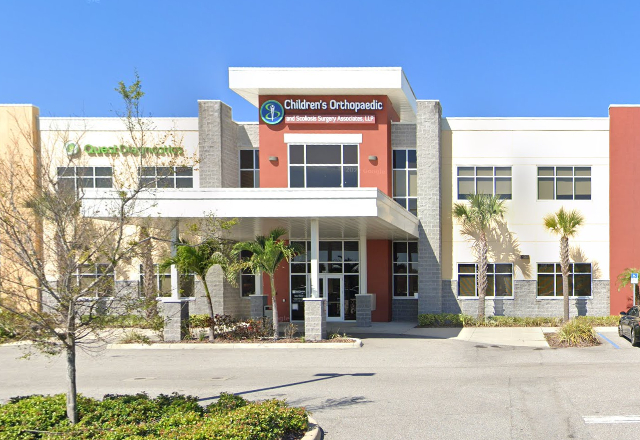
-
Johns Hopkins All Children's Outpatient Care
Sarasota 5881 Rand Blvd., Sarasota, FL 34238
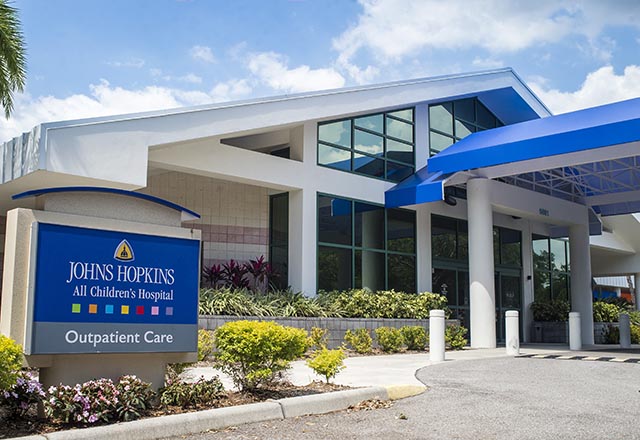
-
Johns Hopkins All Children's Outpatient Care
East Lake 3850 Tampa Road, Palm Harbor, FL 34684
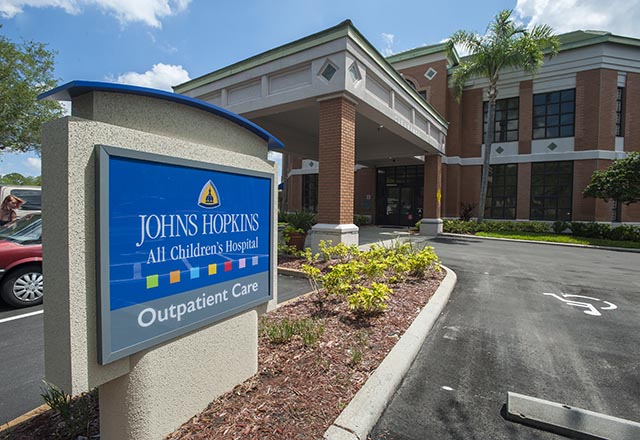
-
Johns Hopkins All Children's Outpatient Care
Pasco 4443 Rowan Road, New Port Richey, FL 34653
